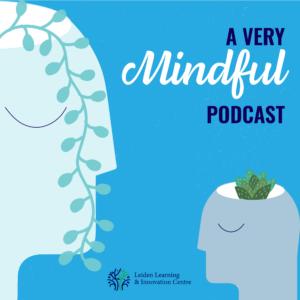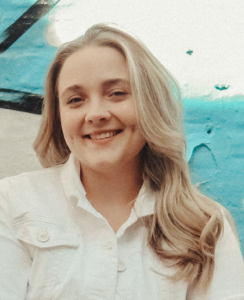A Very Mindful Podcast

Join Aurélien (Season 2) and Nicole (Season 1) as they invite guests from a broad variety of fields to dig deeper into Mindfulness, meditation and mental health.
A Very Mindful Podcast is for students, professionals, and anyone interested in Mindfulness and mental health. The series is composed of episodes focused on mindfulness theory, and practice episodes that introduce a set of Mindfulness exercises.
A Very Mindful Podcast

Join Aurélien (Season 2) and Nicole (Season 1) as they invite guests from a broad variety of fields to dig deeper into Mindfulness, meditation and mental health.
A Very Mindful Podcast is for students, professionals, and anyone interested in Mindfulness and mental health. The series is composed of episodes focused on mindfulness theory, and practice episodes that introduce a set of Mindfulness exercises.
Introduction to A Very Mindful Podcast – Season 2
Meet Aurélien the host of Season 2 and find out what to expect from episodes in the series, and what kind of insights he will explore.
Season 2
THEORY 2.1 – Looking into the mirror
In this episode, Aurélien introduces the second season and considers why bother about mindfulness in the first place. By simply looking into the mirror we can find the answer.
THEORY 2.2 – Clearing the Fog on on Mindfulness
In this episode, Aurélien uncovers common misconceptions surrounding mindfulness meditation. Join us in this theoretical episode explaining more clearly what to expect and importantly what NOT to expect from meditation practice.
THEORY 2.3 – The Nature of Experience
Aurélien dives into fundamental insights on experience and the mind that are encountered on the meditative path. Join him in this theoretical episode explaining the fluid nature of consciousness, the importance of mindfulness in dealing with emotions, and the illusion of the self.
TALK 2.4 – How your mind owns you – with Noah Maure
Aurélien is joined by meditation practitioner and guide, Noah Maurer. Together they explore Sahji yoga (his particular branch of meditation), after they move onto mindfulness and meditation more broadly. They explore why meditate in the first place, what students specifically can get out of it, how to understand detachment, and how mindfulness helps develop emotional intelligence. They end by discussing how stress is the bigger problem and reveal practical tips on how to counter it with methods that complement meditation well.
TALK 2.5 – We-Flow – with Stéphane Segatori
Aurélien speaks with Stéphane Segatori, a Business Intelligence Consultant and the Director of the We-Space lab, a company devoted to help businesses incorporate mindfulness-based techniques into a professional working environment. They discuss how lifeless business culture has become and what is lacking at a personal level in today‘s workplace. This also relates to university culture, and how students can benefit from applying We-Flow principles to their study environment; things that include playfulness, excitement and the joys that can be found through mindful collaboration.
TALK 2.6 – The Learning Mindset – with David Ehrhardt
Aurélien speaks with Prof. David Ehrhardt, an Associate Professor of International Development at Leiden University College whose passion for learning and teaching led him to develop the Learning Mindset Journal for university students. They discuss the process of learning and the importance of making mistakes, the power of journaling in learning about how to think. They talk about the relative importance of grades relative to other measures, advice to students to make the most of their years at university, and many other topics.
TALK 2.7 – Peeking behind the Curtain – with Dan Lehman
Aurélien speaks with Dan Lehman, a meditation practitioner and guide for university staff at the Technical University in Eindhoven. They discuss why one would purposefully seek discomfort, the difference between pain and suffering, how meditation can help reduce suffering, while one can use painful experiences to empower oneself through detachment. They further explore how the ‘self’ could be conceived as an illusion, and what is meant by self, and finally what can be concluded on whether humans truly possess free will.
Season 1
THEORY 1: What is Mindfulness? Definitions & History of a popular practice
In this episode, Nicole covers popular definitions of Mindfulness, with a focus on the Mindfulness-Based-Stress-Reduction program. Join our first theoretical episode for a journey through history and scientific research, and learn more about the background of a diverse practice.
PRACTICE 1: Body Scan Meditation
In this practice episode, Nicole will guide you through your body with a non-judgmental scan. Body scans release tension and bring awareness to corporeal sensations and discomfort. The goal is not to relieve but to learn and become acquainted with your own body.
THEORY 2: Mindful Leadership with Kiki Vreeling
In our second theory episode, Nicole speaks to Kiki Vreeling, a mindful leadership coach and researcher, about mindful leadership and dealing with change. Learn more about the leadership skills that mindfulness can help us develop, and how to mindfully adapt to new circumstances.
More info
Go to Kiki’s website, or connect with her on LinkedIn or Instagram.
PRACTICE 2: Sitting Meditation
During this practice, Nicole will guide you through different fields of awareness. From your breathing and hearing, to the awareness and focus of your thoughts. This meditation is suited for anyone who has already practiced Body Scan Meditation before, as it includes moments of silence that provide the opportunity to be mindful.
THEORY 3: The Inner Process of Change with Katie Busch
Nicole talks to Katie Busch, a Leiden University and Diversity Network (LUDEN) intern and teaching assistant, about the personal developments that contribute to greater diversity and inclusion. Katie shares her journey of setting up “the space in between”, a place where students and staff meet to reflect upon their own privileges and co-create a place of learning and growth.
More info
The Space Inbetween: email | Instagram.
Connect with Katie Busch on LinkedIn
PRACTICE 3: Visualization Meditation – Mountain
Take a visual forest walk where you will visualize a mountain and relate what you see to your daily thoughts and emotions. This is a practice suitable for beginners and everyone who wants to turn off busy thoughts during the day.
THEORY 4: Mental Health Among Students with Roos ter Elst
Nicole talks to Roos ter Elst, a student wellbeing counsellor, about how wellbeing affects to academic success, what role teachers play in student wellbeing and how Mindfulness can improve learning outcomes.
Connect with Roos on LinkedIn
PRACTICE 4: Visualization Meditation – Ocean
In this guided meditation, Nicole will guide you through the calmness of the ocean, allowing you to relax and experience stillness at your own pace. This is a practice suitable for beginners and everyone who wants to relax and unwind.
THEORY 5: Positive Psychology with Daniek Bosch
In this episode, Nicole talks with Daniek Bosch, an expert at the Centre for Innovation (Leiden University) about positive psychology and its relation to Mindfulness. Join us for a deeper insight into the VIA character strengths, as part of positive psychology to learn more about helpful exercises and tools for self-development.
Connect with Daniek on LinkedIn.
About Nicole

Nicole is a Student Assistant at the Leiden Learning & Innovation Centre and a student of International Studies. She is interested in Mindfulness and buddhist philosophy and is currently working towards becoming a certified MBSR teacher (Mindfulness-Based-Stress-Reduction).
Connect with Nicole on LinkedIn.
Additional Resources for Theory Episode 1
The Effects and Efficacy of Mindfulness:
Dunning DL, Griffiths K, Kuyken W, Crane C, Foulkes L, Parker J, Dalgleish T (March 2019). “Research Review: The effects of mindfulness-based interventions on cognition and mental health in children and adolescents – a meta-analysis of randomized controlled trials”. Journal of Child Psychology and Psychiatry, and Allied Disciplines. 60 (3): 244–258. doi:10.1111/jcpp.12980. PMC 6546608.
Mindfulness in Psychiatry and Clinical Psychology:
Goldberg SB, Tucker RP, Greene PA, Davidson RJ, Wampold BE, Kearney DJ, Simpson TL (February 2018). “Mindfulness-based interventions for psychiatric disorders: A systematic review and meta-analysis”. Clinical Psychology Review. 59: 52–60. doi:10.1016/j.cpr.2017.10.011. PMC 5741505. PMID 29126747.
Benefits of Mindfulness for practitioners with mild cognitive impairment and Alzheimer’s:
Larouche E, Hudon C, Goulet S (January 2015). “Potential benefits of mindfulness-based interventions in mild cognitive impairment and Alzheimer’s disease: an interdisciplinary perspective”. Behavioural Brain Research. 276: 199–212. doi:10.1016/j.bbr.2014.05.058. hdl:20.500.11794/39836. PMID 24893317. S2CID 36235259.
Some Effects of Meditation:
Buric I, Farias M, Jong J, Mee C, Brazil IA (2017). “What Is the Molecular Signature of Mind-Body Interventions? A Systematic Review of Gene Expression Changes Induced by Meditation and Related Practices”. Frontiers in Immunology. 8: 670. doi:10.3389/fimmu.2017.00670. PMC 5472657.
Neuroplasticity and gyrification processes in the brain of meditators:
Luders E, Kurth F, Mayer EA, Toga AW, Narr KL, Gaser C (2012). “The unique brain anatomy of meditation practitioners: alterations in cortical gyrification”. Frontiers in Human Neuroscience. 6: 34. doi:10.3389/fnhum.2012.00034. PMC 3289949. PMID 22393318. Lay summary – UCLA Newsroom
Dr. Jon Kabat-Zinn’s Mindfulness-Based-Stress-Reduction Program:
“The Stress Reduction Program, founded by Dr. Jon Kabat-Zinn in 1979…” – http://www.umassmed.edu/cfm/stress/index.aspx Archived 2012-04-14 at the Wayback Machine
Mindfulness in the setting of Clinical Psychology:
Bishop SR, Lau M, Shapiro S, Carlson L, Anderson ND, Carmody J, Segal ZV, Abbey S, Speca M, Velting D, Devins G (2006). “Mindfulness: A Proposed Operational Definition”. Clinical Psychology: Science and Practice. 11 (3): 230–41. CiteSeerX 10.1.1.168.6212. doi:10.1093/clipsy.bph077.

